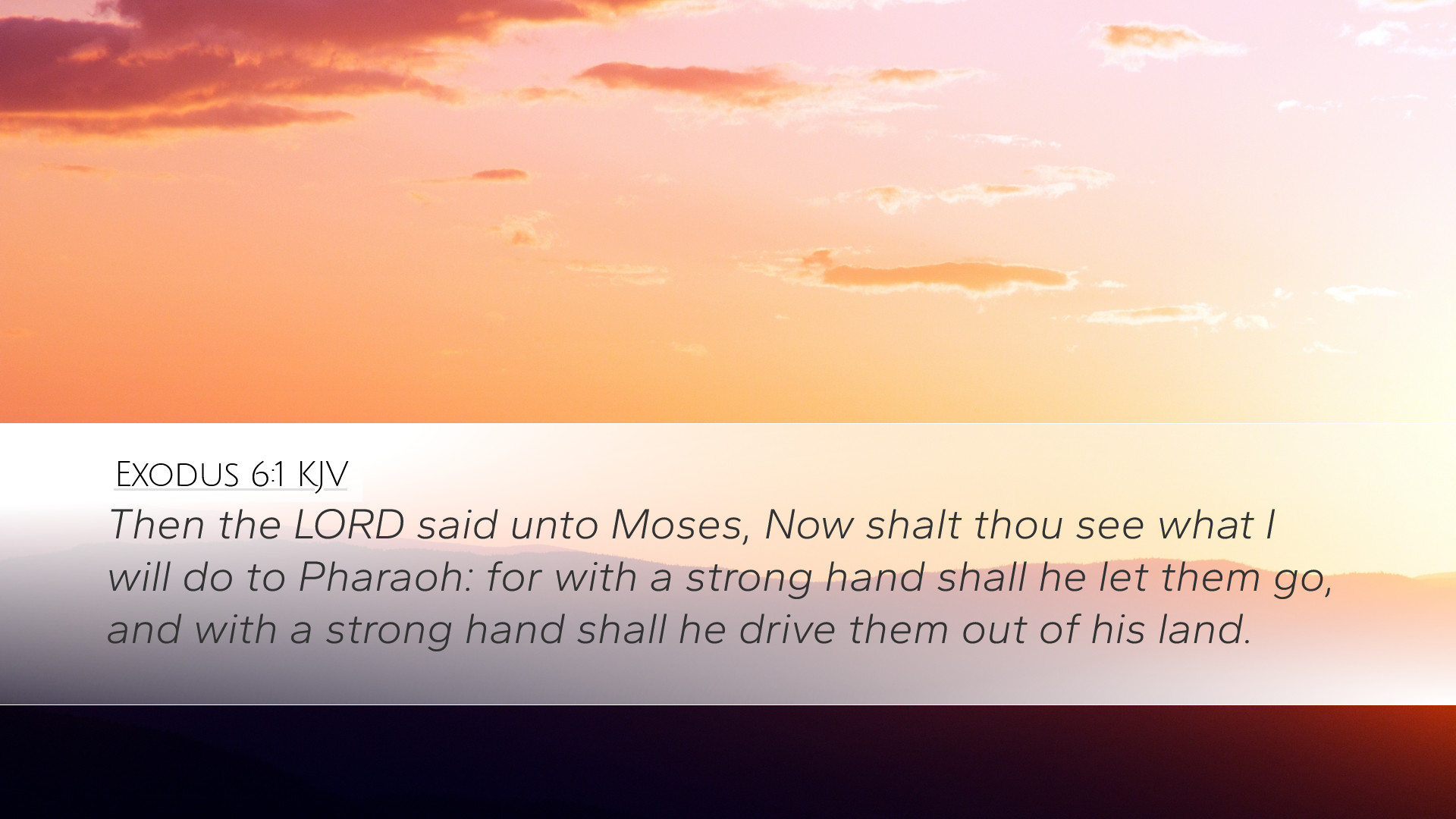Commentary on Exodus 6:1
Verse Text: "Then the Lord said to Moses, 'Now you shall see what I will do to Pharaoh; for with a strong hand he will send them out, and with a strong hand he will drive them out of his land.'" (Exodus 6:1)
Introduction
This verse marks a pivotal moment in the narrative of Exodus, reflecting the transition from Moses' uncertainty and the current plight of the Israelites in Egypt to God’s assurance of impending deliverance. Commentators such as Matthew Henry, Albert Barnes, and Adam Clarke provide various insights into the theological, historical, and practical implications of this verse.
The Lord's Assurance to Moses
Divine Sovereignty: The first aspect to consider is God's sovereignty over the situation. As Matthew Henry notes, the phrase "Now you shall see" indicates a transition from Moses' human perspective to God's divine plan. This suggests that despite Moses’ fears and doubts, God's purposes will ultimately prevail.
Strength in Action: The mention of God's "strong hand" demonstrates His might and power. Albert Barnes comments that this phrase signifies not just a forceful action, but an intervention that is unmistakably divine. God declares that Pharaoh will willingly send the Israelites away, foreshadowing the dramatic confrontation that is to unfold. Adam Clarke elaborates on this, indicating that there is a duality in Pharaoh's actions: both reluctance and eventual compliance under divine pressure.
Pharaoh's Response
Willingness Under Duress: The duality of Pharaoh's eventual compliance is essential to understanding the narrative. As Albert Barnes points out, the "strong hand" of God implies that Pharaoh will experience a change of heart—not necessarily through desire but through compulsion. This underscores a theological tension between human free will and divine intervention.
The Nature of God’s Judgment: Additionally, Henry notes that this moment signifies not merely a promise of deliverance but also a proclamation of judgment against Egypt. The biblical text invites readers to see God’s sovereignty not just in acts of salvation, but also in the inevitable judgment that will befall those who oppose His divine plans.
Theological Implications
The Role of Faith: For pastors and theologians, this passage emphasizes the necessity of faith amidst trials. Moses, representing the struggle of the Israelites, receives assurance from God that His plans are unshakeable. For contemporary believers, this provides a model for trust in divine promises, even when circumstances appear to contradict them.
Leadership and Obedience: This verse can serve as an educational component for leaders within the church. God's reassurance to Moses exemplifies how divine guidance may come amidst uncertainty. Henry states that leaders are often in positions where faith must outpace their understanding. This encourages spiritual leaders to look to God for direction, especially when facing formidable challenges.
Practical Applications
- God’s Promises: Reflecting on this verse encourages believers to revisit God’s promises in their lives, recognizing that His interventions may come in expected and unexpected ways.
- Trust in Crisis: Encouraging congregations to maintain trust in God during seasons of crisis aligns with the reassurance Moses received. Practical teaching can be derived from how God's assurances can enable perseverance.
- Understanding Divine Timing: The verse invites meditation on the nature of divine timing. Just as God commanded Moses to wait for Pharaoh’s deliverance actions, believers today are reminded that God orchestrates events according to His perfect schedule.
Conclusion
Exodus 6:1 serves as a profound reminder of God’s control over historical events and personal lives. The insights provided by various commentators underline the themes of divine sovereignty, the unpredictable nature of human responses to God’s will, and the enduring need for faith in the face of adversity. For pastors, students, and scholars alike, this verse serves as both a source of hope and a call to faithful obedience.


